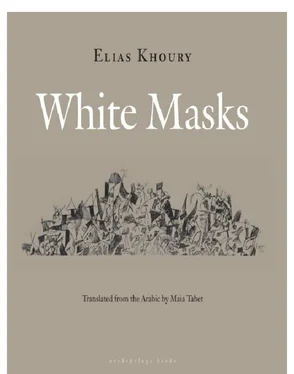“Give me the posters!” I shouted back, trying to pull them from his grasp, but he held on tight. As I tugged at them again, the posters tore. The sight of them ripped was like an electric shock for him: as if the demons had vacated his body all at once, as if… how to put it… He stood there staring at the posters, and as his whole body shook, great big tears rolled down his cheeks, glistening in the white growth coming through his beard. Straightening up, he teetered and made his way over to a corner of the room, where he crouched down with his face in his hands.
I went to him. “Khalil, forgive me,” I said to him.
He did not lift his head, and his body was racked with sobs.
To be honest, at that point I got scared. Dear God, what have I done? I thought. The man is sick and I’m just making him worse. Damn the posters! Let him tear them all up if it makes him feel better. . what’s it to me!
No longer knowing what to do, I left the room and didn’t go back in for several days after that, leaving him alone to do as he pleased. I would just take in a plate of food, some bread and water, and leave them for him. Even cleaning became impossible: what was there to clean anyway, I was afraid he’d get upset and start crying again if he saw me removing the shreds of torn paper. I left everything just as it was, with him between the corner and the torn posters. The erasers had disappeared, except for a small one lying on a torn poster; and now there were knives scattered over the ground, along with a straight razor and some tiny blades.
And he started all over again, except that now he wasn’t erasing anymore, he was shredding the posters. He sliced the paper into tiny shreds that he dipped in water, kneaded into little balls of brownish dough, and then lined up all along the wall as he chuckled quietly to himself.
I tell you, these things happen. . The man was sick, his nerves had given out and he was at the end of his tether. No, his job had nothing to do with it. Perhaps Imm ’Imad was right after all, maybe she was, but I wasn’t asking for anything, I swear I made no demands on him — sex isn’t everything, you know, and anyway what would I want with sex after all that had happened?
Days passed like this, with him holed up inside the room and me going along with whatever he did, so there was no more tension between us. But then he was finished with the newspaper cuttings and the posters, and there was nothing left for him to do. I told him one day that I wanted to remove the little “dough” balls from the room but he wouldn’t let me.
“I need them,” he said. So I left them.
Gradually, he stopped spending all his time in the room. He started walking about the house and opening drawers, as if he were searching for something. When I asked him if I could help in any way, he just replied, “No.”
He’d open a drawer, rifle through its contents, close it, and then open another one. I followed him around and found him carting off all our family photographs: pictures of him as a little boy, of his mother and father, pictures of me and of our wedding, and snapshots of the children — Ahmad in his school uniform, Ahmad the boxer, Ahmad in fatigues. He gathered them all up with this almost childish joy, and carried them off to his room. There he laid them on the floor and set them out ever so carefully. . into, sort of, crescent shapes. He’d make one crescent, then another, and another, until he had a whole array of identical shapes.
Then he sat down and started: using a bottle of white nail polish, he painted the face over in white and then cut off the head with scissors. He worked carefully and methodically to separate the head from the body. Then he gathered up the severed white heads, shuffled them, and combined each head with one of the decapitated bodies, so he had all these white-headed photographs. . then he gathered all the heads up again and stacked them next to the crescents of photographs.
“What are those?” I asked him.
“They’re everybody’s heads,” he said; then he began giving them strange names.
“But they’re our heads,” I retorted.
“No, no, you don’t understand, these are other people’s heads. Look, this is the head of Ahmad al-Houmani, and that’s his mother’s, and that’s Munir al-Kaadi’s head.” He was quiet for a moment, and then, looking at me strangely, added: “I killed them. I killed them, I had to… They’re the people. .”
“But who are they?” I asked him.
“They’re people from here,” he replied, “from Beirut, they work with me at the post office, and I caught them making fraudulent phone calls. I don’t know what they were saying, they were speaking in French, but I’m sure about it.”
“But they’re our heads.”
“No, no, no, woman! I’m sure they’re the ones behind the disappearance of Jameel Hamdan.”
“And who is Jameel Hamdan?”
“Oh, you don’t know anything. No one does. . but I know. He’s a colleague of ours, the one who disappeared. He’s my friend, who was hanged.”
But no one was hanged, what was the man talking about? It was true that Jameel Hamdan had disappeared during the war and his body was never found — the young men said he’d disappeared at the Aadliyyeh checkpoint. He was executed, for sure, but he wasn’t hanged. In any case, no one was hanged during this war, there wasn’t ever any time: you were kidnapped, tortured — there was a lot of talk of torture, but I never believed a word of it — and then you were shot. And you know how fast a bullet is. But it had nothing to do with me, or my husband, it wasn’t any of our business. So why was he talking like that and cutting off those heads? He always said it had nothing to do with us and he was against killing.
Then he set to the hands: he painted them white, cut them out in small rectangles, and stacked them in a pile. Then it was the thighs, until gradually, all that was left of our family photographs was this huge collection of white photo fragments, stuck to each other with nail polish.
Once he was finished with the family photos, he again had nothing to do — so he just sat silently, and hardly walked around the house even. I tried to clean up the white fragments strewn across the room, and to tidy up a bit, but he wouldn’t let me. I suggested that he shave, since he hadn’t in ages, and after hesitating for a long time, he agreed. I heated up some water for him and laid out his razor, shaving cream, and brush. When he went into the bathroom, however, he was holding the scissors.
“What are the scissors for?” I asked.
He stood in front of the mirror and began snipping at his beard. As the hairs fell into the washbasin his face was slowly transformed, but he didn’t seem to notice. In fact, he barely glanced at the mirror.
“What are you doing?” I asked.
“Working, working.”
He carried on trimming his beard like this, with the tap turned on all the way; the hairs cascaded down, while he sprinkled the sides of the wash basin from the cup of hot water he held in the other hand. Then he took the brush, smeared on some shaving cream, and started shaving with the razor, while whistling a Fayrouz tune. I stood watching him.
He finished, and dabbed some aftershave on his cheeks. Then he coated the brush with more shaving cream and began smearing the mirror. As he covered the mirror with foam, little gaps would form, so he kept going over them again and again to make sure everything was covered in white, all the while whistling that little ditty Ya Dara Douri Fina, if I remember well.
He was at it for two hours, and still the gaps kept on appearing, while I stood there watching him without knowing what to do.
“It’s over, everything is over,” I thought I heard him say.
Читать дальше












